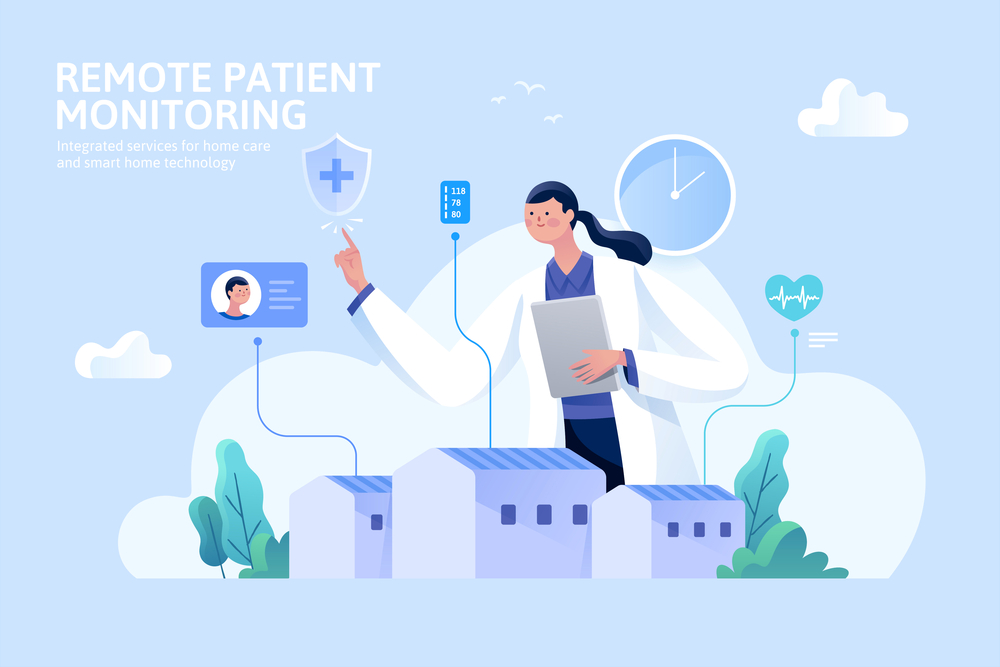The healthcare landscape is undergoing a significant change, because of a recent emphasis on patient-centric care, preventative medicine, and chronic disease management. While traditional in-person consultations remain crucial, they often encounter limitations in terms of accessibility, cost, and efficiency. This is where remote patient monitoring (RPM) emerges as a transformative tool, offering the potential to revolutionize healthcare delivery and empower physicians to provide superior care for their patients.
The demand for patient-centric care is escalating. Patients are seeking personalized and accessible healthcare solutions more than ever. The rising prevalence of chronic conditions necessitates proactive management. Early detection and timely intervention are critical, and RPM can play a pivotal role in achieving these goals.
What is Remote Patient Monitoring?
RPM refers to the utilization of technology to collect and transmit health data from patients outside the traditional clinical setting. This data provides vital signs, symptoms, medication adherence, and other relevant information, allowing healthcare providers to monitor patients’ health more regularly. Advancements in wearable technology, mobile applications, and data communication platforms have made RPM an increasingly accessible solution.
But how does the future of RPM benefit physicians?
The advantages are multifaceted, leading to potential improvements in several key areas:
- Enhanced Patient Outcomes: RPM helps doctors monitor patients’ health continuously, leading to early detection of potential issues. Imagine being able to remotely monitor a patient with a chronic condition and receive alerts if their data deviates from normal ranges. This allows for earlier intervention and improved patient outcomes, potentially reducing complications and hospitalizations.
- Increased Practice Efficiency and Productivity: RPM can significantly improve efficiency and productivity by allowing doctors to conduct remote consultations. This saves time and resources otherwise spent on unnecessary in-person visits, allowing doctors to schedule appointments more efficiently, prioritize urgent cases, and dedicate more time to patients requiring in-person care. Ultimately, this can foster a more balanced work-life experience for healthcare providers.
- Improved Cost Management: RPM can contribute to enhanced practice management and cost reduction by facilitating closer monitoring and earlier intervention, potentially leading to reduced unnecessary hospital readmissions and emergency department visits. Improved medication adherence, facilitated by remote monitoring and patient education, can contribute to further cost savings for both patients and healthcare institutions.
Advantages of RPM for Physicians
One significant advantage of RPM for physicians lies in its ability to facilitate proactive and personalized care. With continuous monitoring of patient’s health data, doctors gain insights into their patients’ day-to-day well-being. Without RPM, physicians are limited to the confines of periodic appointments.
This deeper understanding enables physicians to tailor treatment plans more precisely, adjusting medications or interventions promptly based on real-time trends. Imagine a scenario where a patient with hypertension exhibits fluctuating blood pressure readings. Through RPM, their doctor can identify patterns, assess the effectiveness of prescribed medications, and intervene to prevent potential complications like hypertensive crises or organ damage.
RPM assists physicians in engaging in more meaningful and impactful patient interactions. By remotely tracking vital signs and symptoms, doctors can initiate discussions with patients based on concrete data, fostering a collaborative approach to healthcare management. This enhances patient satisfaction and strengthens the therapeutic alliance between doctors and their patients, leading to better treatment adherence and outcomes.
Is RPM Proactive?
RPM offers opportunities for proactive risk management and preventive interventions. By continuously monitoring patients at risk of developing complications, such as those with diabetes or heart disease, physicians can implement preventive measures early on, reducing the likelihood of disease progression or acute exacerbations. Timely adjustments to medication dosages or lifestyle recommendations based on RPM data can help stabilize patients’ conditions and minimize the need for emergency interventions or hospitalizations.
In essence, the future of healthcare lies in harnessing the potential of RPM to transform the traditional patient-provider dynamic. By leveraging technology to facilitate continuous monitoring, personalized care, and proactive interventions, physicians can not only enhance patient outcomes but also optimize their practice efficiency and workflow. Embracing RPM opens doors to a new era of healthcare delivery, where the boundaries of time and distance no longer limit the quality and accessibility of patient care.
How Can AM Health Management’s RPM Services Help?
AM Health Management is at the forefront of this exciting revolution, providing physicians with comprehensive and user-friendly RPM solutions. Our secure and HIPAA-compliant platform offers a suite of features designed to empower healthcare providers and enhance patient care, including:
- Remote data collection from wearable devices, mobile apps, and other monitoring tools.
- User-friendly dashboards for real-time data visualization, analysis, and trend identification, allowing for informed decision-making.
- Secure communication channels for efficient communication with patients, facilitating feedback and timely treatment adjustments.
AM Health Management understands that physicians might have concerns regarding data security, patient adoption, and workflow integration. We address these concerns by prioritizing the following:
- Robust security measures, employing state-of-the-art encryption to safeguard sensitive patient data.
- Comprehensive training materials to ensure user comfort and proficiency with our RPM platform.
- Seamless integration with existing workflows, minimizing disruption to established practice routines.
How RPM Can Help Your Patients Today
Real-world applications of RPM across various medical specialties demonstrate its potential impact. Studies have shown that RPM can lead to earlier detection of complications, improved medication adherence, and reduced hospital readmissions. These improvements can translate to better patient health outcomes, increased patient satisfaction, and enhanced practice efficiency.
The future of healthcare is undeniably connected to RPM. By harnessing the power of technology, physicians can empower their patients to take an active role in their health management, enhance the quality of care, and improve the efficiency of their practices.
At AM Health Management, we are committed to providing physicians with the tools and resources they need to thrive in this evolving landscape. Contact us today to discuss how our RPM solutions can benefit your practice and ultimately, the well-being of your patients.


0 Comments